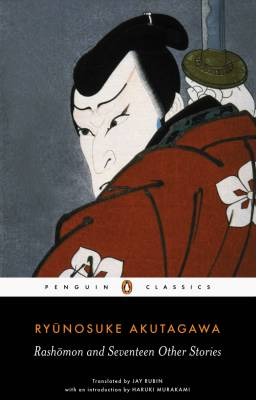I bought the new Penguin Classic, Rashōmon and Seventeen Other Stories by Japanese author, Ryūnosuke Akutagawa (1892-1927), with the intention of furthering my knowledge of Japanese fiction and its writers beyond Mishima and the spaghetti obsessed Murakami. What I found in this collection is an interesting mix of stories providing an adequate introduction to Akutagawa, but not enough, perhaps, to interest me further.
Preceded by a foreward by the aforementioned Haruki Murakami, the collection is split into four parts by translator Jay Rubin. This division is to differentiate the works between different parts of the author’s short life much like Picasso’s output can be pigeonholed into such periods as blue and rose. So, we have his early retelling of Japanese legends and anecdotes through to conflicts between native religion and Christianity missionaries, on to modern works highlighting both tragic and comic circumstances, before reaching his biographical work in which he showcased his own madness.
For me, the earlier stories of Akutagawa proved more interesting. Rashōmon, which provided the title for Akira Kurosawa’s 1950 film, is followed by In A Bamboo Grove, the story upon which the film was based. The Nose, a comic tale of vanity, is followed by the great Dragon: A Potter’s Tale, which in turn is followed by the wonderful, albeit predictable, Hell Screen, a story about an artist who requires to see his subject matter so that he may capture it on canvas; thus, when commissioned to paint Hell, he sets about having his vision of Hell recreated before him so that he may recreate it with measured strokes.
Of the later stories there are few standouts, although that may just be my preference for stories set in a highly romanticised medieval Japan than in a period (the 1920s) in which I know little of the nation. The stereotypical legends of samurai, peasants, and overlords sit far more comfortably with me than a beautiful history deeply influenced by western imports. One of the better stories is Horse Legs, a Kafkaesque tale in which a Japanese Gregor Samsa wakes to find that he has equine legs, complete with hooves, and there follows comic situations as he attempts to hide his secret from everyone, notably the wife whom he shares his bed. The Writer’s Craft was another story that sat well with me, a tale about how the appreciation of an author’s work is not determined by the time put in but by how others interpret it within their own lives.
The collection gathers together a blend of Akutagawa’s well known short pieces in addition to a bunch of stories translated to English for the first time. While some of these freshly translated stories appealed, I couldn’t help feel it was a cynical attempt to force a few new tales on those already initiated with the author’s work: one story, for example, is just a fragment of a longer unfinished piece.
Akutagawa’s writing, at least in translation, is certainly vibrant and his stories come at you from all manner of narrators, the most common seeming to be told from the point of view of someone who witnessed the events but was not integral to the plot. Later stories, such as The Life Of A Stupid Man, show interesting attempts at style but the narrative (a series of numbered paragraphs with individual titles) is so personal that it would seem to be only of interest to friends and family of the author, in addition to Akutagawa scholars.
All in, this book serves to give me an introduction to the author and, with the extensive footnotes, a further understanding of different periods in Japan’s history. But, given my indifference to many of the stories, especially Akutagawa’s more personal pieces, I doubt I’ll go in search of his previously translated works, although the occasional retelling of previous Japanese tales may be enough to pique my interest in others of a similar nature.

I just found that Akutagawa’s, as well as some other famous Japanese writers’, work is available at Kindle in original Japanese language. Good to know that Kindle contents are available for viewing on iphone, ipod-touch, and PCs as well.
Go to Kindle store and search “akutagawa” and you’ll find full selection there! Go visit Kindle.Amazon.com